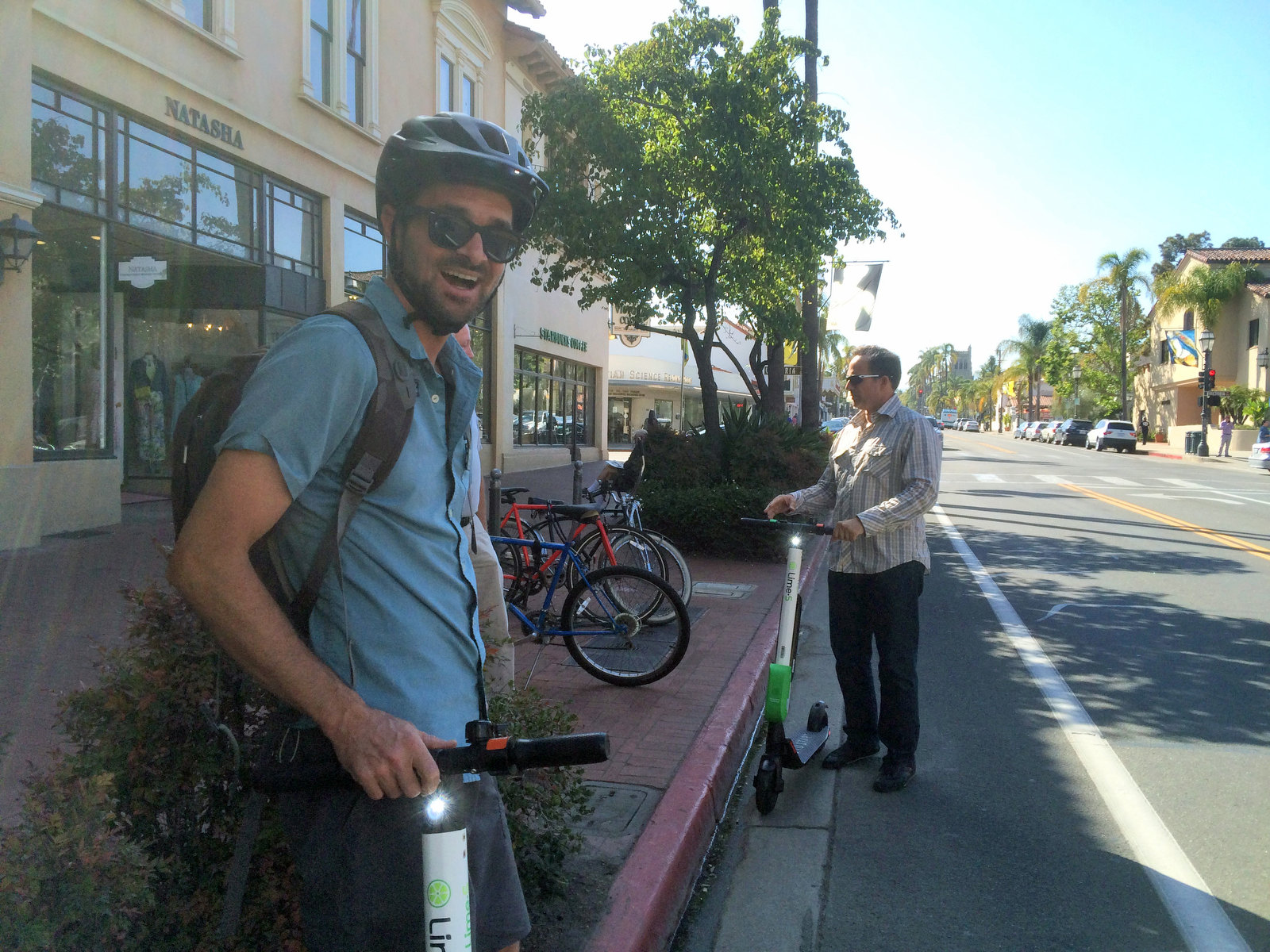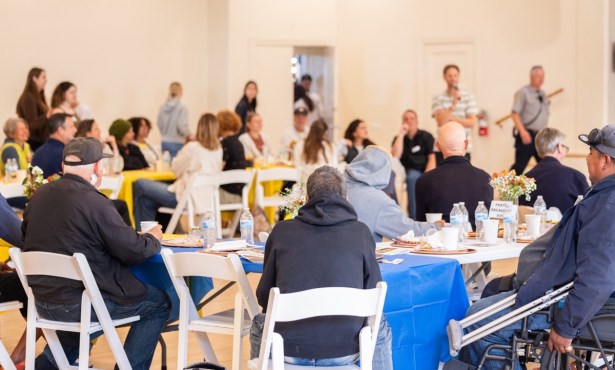Invasion of Electric Scooters Hits Santa Barbara’s State Street
Can Santa Barbara Handle Something Fun and Functional?

It’s official; they’re coming. In fact, they’re already here.
Last Friday, 100 lime-green electric scooters mysteriously showed up on State Street sidewalks to be picked up and ridden by anyone with a few bucks and the capacity to download apps. As usual, the city mothers and fathers were up in arms and began impounding the alien intruders almost immediately. In the first three days, no fewer than 150 were seized and locked up. Proper permits had not been obtained. In Santa Barbara, the only semi-spontaneous act still tolerated is that of dying.
A few months ago, electric scooters as a mass phenomenon didn’t exist. Now, it seems, they’re everywhere, choking sidewalks — to hear some talk of it — in cities all over California. They are at once exceptionally utilitarian and irresistibly exhilarating. In other words, they are here to stay.
In Santa Barbara, the scooters are the handiwork of LimeBike, a bike-share company that’s headquartered in San Mateo. LimeBike began to set up their Santa Barbara operation a few weeks ago. But the real trouble began when Limbic Launch Wizard Cameron Swanson held a launch party at State Street’s Impact Hub, passing out 100 scooters. Swanson had been meeting with city officials, including Urban Non-Car Czar Rob Dayton, who had both asked and told Swanson not to launch last week. An emergency permit was in the offing, Dayton said. Wait.
LimeBike is infamous for its culture of strategic impatience, hence the nickname “Slime Bike.” Swanson is new to the company and newer still to Santa Barbara. He either failed to comprehend the meaning of “wait” or simply chose to blow off Dayton. On Friday, when those 100 scooters hit the streets, 34 were impounded. On Saturday, LimeBike doubled down, putting even more scooters out. City Hall impounded 80. On Sunday, it was the same dance, but only 34 scooters seized. Although no one was shot, Eliot Ness would have been proud.
In an interview early Monday morning, Swanson expressed surprise and disappointment over the vehemence of the city’s reaction. LimeBike, he said, would stop putting scooters out — at least for the time being. But the company was asking customers, he said, to email city elected officials to voice their support for the new micro-mobility option. I suggested Swanson and his company appeared to have “stepped on their own dicks” in dealing with City Hall. It was early in the morning. Though he insisted otherwise, he sounded like he had just gotten up. It took him a while to answer. “No,” he replied, he did not think any male organs had been trod upon during the launch.
To state the obvious, it doesn’t help anyone’s cause to arouse the irascibly righteous wrath of City Attorney Ariel Calonne. Calonne compared LimeBike to Uber, Lyft, and every nefarious vacation-rental operator combined. He let it be known City Hall would not tolerate any ill treatment. Calonne added if homeless people were to be chased off city sidewalks, it wouldn’t do for City Hall to allow electrified scooters to congregate there like heaps of elephant seals. There is such a thing, Calonne stressed, as equity.
Started last year, LimeBike is part of the new, exploding bike-share industry. Their target customers are supposed to be millennial worker bees who don’t wish to be encumbered by ownership responsibilities, even of bicycles. Companies like LimeBike had been offering pedal bikes and electric bikes to rent when a few months ago, they discovered that the demand for scooter shares — inadvisably referred to as “Scoo-Share” — was easily three times more than that of bike shares.
Unlike the State Street shuttle — cumbersome, plodding, and picturesque in an old-school Disneyland sort of way — bike shares and scooter shares require no public subsidy to provide what transportation planners refer to as micro-mobility options. Private investment capitalists are in a collective state of heat over the bike-share market, all but forcing millions into the pockets of bike-share moguls daily. The drive to expand market share is in full gold rush frenzy. In this context, “please,” “thank you,” and permit applications qualify as quaintly unaffordable delays.
But there are real issues. First, it’s against the law to ride on sidewalks and for good reason. It’s stupid and unsafe. Second, there’s the issue of helmets. State law requires anyone riding a motorized vehicle — especially one that zips around at 15 miles an hour — to wear a bike helmet. It’s not incumbent on bike-share companies, however, to provide the helmets. That responsibility belongs to the rider. One bike-share company is trying to get the laws changed in Sacramento to allow sidewalk riding — dumb — and to allow adults to ride without helmets — well, maybe. Helmet laws, while well intended, are all but unenforceable.
It’s worth noting that UCSB will be home to 300 bike-share bikes as of July 30. By September that number will double to 600. By the following year, it will be 1,200. Today, the Goleta Valley. Tomorrow, the world.
More immediately, next Tuesday, the City Council is poised to pass an emergency ordinance that will allow up to 300 of these new scooters on city streets effective immediately and up to two companies to operate. For the record, this is absolutely the fastest City Hall has moved over anything in the history of ever.
I’d like to think this is in atonement for having run the food trucks out of town. More likely, it’s a recognition of new realities. Scooters work. They’re fun. And they’re here. (But, of course, so too were the food trucks.)



